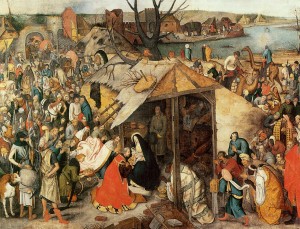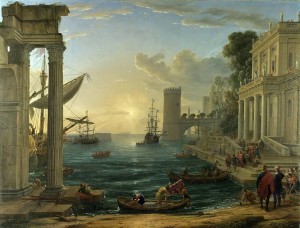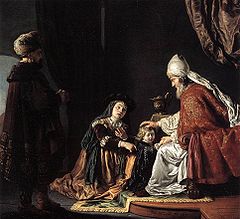[The Adoration of the Magi, Brueghel, Pieter (the Younger)]
The following talk is from a service that took place at Victoria College in December 1973:
On Christmas
Northrop Frye
There is no indication in the New Testament of the time of year when Jesus was born, and the infancy narratives in Matthew and Luke are relatively late. The earlier Gospels, Mark and John, begin with the Baptism, which became the main festival, outside Easter, in the eastern churches. The western churches seem to have introduced Christmas because of a feeling that the natural birth of Christ should be emphasized, to counteract a feeling that Jesus was not a man who was born and died, but a kind of ghost who manifested himself for a time and then disappeared. We don’t know why the Church decided on December 25, but it looks as though Christianity, for once, was adopting something outside the Biblical tradition. Almost every people in the ancient world had some kind of festival at the winter solstice, the time of year when the nights are longest, when some kind of primitive fear emerges that the sun might go out altogether if not encouraged by a ritual of lights and fires. In the great rival religion of Mithraism, which stretched from Persia to Scotland, the chief festival was the birthday of the “unconquered sun” on December 22, and Northern Europe had its “Yule,” when a great log was ceremonially set burning.
In the Church calendar Christmas is preceded by four weeks of Advent, a sombre, brooding season of the gathering powers of darkness. The infancy stories grow, in part, out of the Exodus story of the Passover, when the Angel of Death was let loose in Egypt and the Israelites held their first Passover standing up and in haste, ready for a quick and silent departure. This feeling recurs in the infancy stories with the account of the slaughter of the innocents, the flight of the Holy Family to Egypt, and the stealthy departure of the wise men. The book in the Apocrypha called the Book of Wisdom describes the time of the first Passover thus:
[For while all things were in quiet silence, and that night was in the midst of her swift course,
Thine Almighty word leaped down from heaven out of thy royal thone, as a fierce man of war into the midst of a land of destruction,
And brought thine unfeigned commandment as a sharp sword, and standing up filled all things with death; and it touched the heaven, but it stood upon the earth.(Wisdom of Solomon 18:14–16)]
This is the starting point of the tradition that Christ was born at midnight, just as he was crucified at noon. Besides the two infancy stories, there is a third account of the birth of the Messiah in the New Testament, in Revelation 12, a much more obviously mythical account, and this too preserves the sense of blood and terror and menace in the Christmas story:
And there appeared a great wonder in heaven; a woman clothed with the sun, and the moon under her feet, and upon her head a crown of twelve stars:
And she being with child cried, travailing in birth, and pained to be delivered.
And there appeared another wonder in heaven; and behold a great red dragon, having seven heads and ten horns, and seven crowns upon his heads.
And his tail drew the third part of the stars of heaven, and did cast them to the earth: and the dragon stood before the woman which was ready to be delivered, for to devour her child as soon as it was born.And she brought forth a manchild, who was to rule all nations with a rod of iron: and her child was caught up unto God, and to his throne.
And the woman fled into the wilderness, where she hath a placed prepared of God, that they should feed her there a thousand two hundred and threescore days.(Revelation 12:1–6)
W.H. Auden’s radio drama, For the Time Being, also called a Christmas Oratorio, begins with a section called Advent, where the growing power of darkness is linked to the exhaustion of the Roman Empire and the fact that even at the height of its power the barbarians who will eventually destroy it are gathering on the frontiers. The parallels between the time of Christ’s birth and our own time emerge very clearly:
Darkness and snow descend;
The clock on the mantlepiece
Has nothing to recommend,
Nor does the face in the glass
Appear nobler than our own
As darkness and snow descend
On all personality.
Huge crowds mumble—‘Alas,
Our angers do not increase,
Love is not what she used to be’;
Portly Caesar yawns—‘I know’;
He falls asleep on his throne,
They shuffle off through the snow:
Darkness and snow descend. (pt. 1, ll. 1–14)
In Blake’s Introduction to the Songs of Experience, the poet, who is also a prophet, calls to the earth to stop turning away into the dark, and remain in the light, which is also here as well as the darkness. Blake’s poem may not sound much like an Advent poem, but it is one.
O earth O Earth return!
Arise from out the dewy grass;
Night is worn,
And the morn
Rises from the slumberous mass.Turn away no more:
Why wilt thou turn away
The starry floor
The watry shore
Is giv’n thee till the break of day.Robert Southwell was a Jesuit priest in the England of Elizabeth I, who was arrested in 1592 and spent the last three years of his life in prison. He was examined thirteen times, generally with torture, and finally hanged. So there wasn’t much about the other side of the Christmas season of peace and good will that he didn’t know.
James Reaney’s A Suit of Nettles is a series of twelve eclogues, one for each month of the year, in which the speakers are geese. Naturally for geese the Christmas season is the time of death, when they get their heads chopped off to provide Christmas for other people. So the only suggestion that the geese might have Christmas feelings of their own has to come out at the end of the November eclogue:
MOPSUS
A sun, a moon, a crowd of stars,
A calendar nor clock is he
By whom I start my year.
He is most like a sun for he
Makes his beholders into suns,
Shadowless and timeless.
At the winter sunstill some say
He dared be born; on darkest day
A babe of seven hours
He crushed the four proud and great directions
Into the four corners of his small cradle.
He made it what time of year he pleased, changed
Snow into grass and gave to all such powers.Of the two accounts of the birth of Christ, Luke gives us a pastoral account. He has the manger with its ox and ass, the shepherds on the hillside. Matthew gives us a more urban story, with wise men bringing costly gifts, and has Jesus born in a house. In later legend Matthew’s wise men became three kings, one of whom is traditionally black. For although Matthew says “east,” the wise men seem to have even more to do with the south. They are symbolically repeating the journey of the Queen of Sheba, the queen of the south as Jesus calls her, to King Solomon; gold, frankincense, and myrrh are primarily products of Africa, and coming from Africa they would have to go through Egypt, repeating the journey of the Israelites who were guided to the Promised Land in the night by a pillar of fire.
[The Embarkation of the Queen of Sheba, Claude Lorrain]
But what the wise men really symbolize in the Christmas story is, I think, the universality of the story—in other words, symbolically they come from all points of the compass. The poet Robert Graves has a poem called “To Juan at the Winter Solstice,” which begins by saying that poetry has only one story to tell: I don’t much care for his version of it, but I agree that poetry ultimately tells only one story, and that the winter solstice is one of the times when it gets told. Thus Virgil, a pagan poet writing in 40 B.C., produces a poem which for centuries was taken to be an unconscious prophecy of the birth of Christ. Modern critics, who of course know exactly what was going on in Virgil’s mind in 40 B.C., assure us that he was merely congratulating a friend on the birth of a son. Well, here’s the poem, or part of it, in a nineteenth-century translation by Calverley, and I think you will agree that it is very curious language to use if that were all Virgil was talking about:
Come are those last days that the Sybil sang:
The ages’ mighty march begins anew.
Now comes the virgin, Saturn reigns again:
Now from high heaven descends a wondrous race.
Thou on the newborn babe—who first shall end
That age of iron, bid a golden dawn
Upon the broad world—chaste Lucina, smile:
Now thy Apollo reigns.The Roman equivalent of Christmas was a festival called the Saturnalia, held in December in honour of the Golden Age, or reign of Saturn, which Virgil refers to. The Golden Age was a period of complete social equality, and the main feature of the Saturnalia was a period of liberty given to slaves, who sat at table while their masters waited on them. The Saturnalia was a ritual which said symbolically that the master-slave relationship on which the Roman Empire was based was all wrong.
Christmas is conventionally a season of jollity and good will, but it is also the season of neurosis, loneliness, the gibbering of accusing memories and the wearing of uncomfortable social masks that don’t fit. As I well remember from my administrative days, it is a period when somebody in the academic community is likely to attempt suicide, though fortunately not often with much enthusiasm. The usual model of Christmas in our minds is a cosy, cuddly, Dickensian Christmas which is not very close to conditions of life in 1973. It is an exclusive feast; we withdraw inside our families and write cheques for the organizations that look after those who are colder and hungrier. But the feeling of exclusiveness bothers us more than we realize. The powers of darkness that gather in Advent are also the powers of tyranny and exploitation, of the arrogance of privilege, of the spirit of the first Christmas when the hotels were so full that a pregnant woman very near her time was forced to spend the night in a stable.
In the Bible the sense of society righting its balance, of the poor and oppressed coming into their own, is often symbolized by the story of a barren woman bearing a son late in life. One of the people to whom this happened was Hannah, the mother of Samuel, who sings a song that contains the verse: “The Lord maketh poor, and maketh rich: he bringeth low, and lifteth up.” (1 Samuel 2:7) This verse is the basis for the verse in the Magnificat that you just read: “He hath put down the mighty from their seats, and exalted them of low degree.” (Luke 1:52)
[Hannah giving her son Samuel to the priest, Jan Victors]
There have always been two sides to the Christmas story, and they are an emotional contrast. One is the sense of quiet, of the world coming to a full stop in its course, of peace descending for one breathless instant at midnight under the stars. This feeling finds its focus in the vision of the mother and the child, the mother who is in some mysterious way virgin, bride, and sister as well as mother, the closed garden of the Song of Songs in which the wind of the Holy Spirit moves to create the newborn God .
The Jewish parallel to Christmas is the feast of the dedication of the temple, called Hanukkah. In the persecution of the Jews by Antiochus of Syria, the temple had been defiled by having a statue of a heathen god placed in the Holy of Holies. For the Jews this was the ultimate triumph of the dark powers, which they called, in the King James translation, “the abomination of desolation.” The persecution provoked the rebellion of the Maccabees, and the success of that rebellion led in turn to the rededication of the temple, on the 25th of the winter month Chislev. The 25th of Chislev is not the 25th of December, but the coincidence of numbers is interesting. The feast of the dedication was primarily a festival of lights. Something keeps reminding us the dark powers of the heathen gods had been chased away by the light. We read in 1 Maccabees :
They made also new holy vessels, and into the temple they brought the candlestick, and the altar of burnt offerings, and of incense, and the table.
And upon the altar they burned incense, and the lamps that were upon the candlestick they lighted, that they might give light in the temple. . . .
Look, at what time and what day the heathen had profaned it, even in that was it dedicated with songs, and citherns, and harps, and cymbals.
Then all the people fell upon their faces, worshipping and praising the God of heaven, who had given them good success.
And so they kept the dedication of the altar eight days, and offered burnt offerings with gladness, and sacrificed the sacrifice of deliverance and praise. . . .
Thus was there very great gladness among the people, for that the reproach of the heathen was put away.(1 Maccabees 4:49–50, 54–6, 58)
We notice too how prominent in the Gospels the theme of the cleansing of the temple is: in the Gospel of John it is one of the first things Jesus does. The apocalyptic aspect of this festival is picked up in the Book of Revelation:
And I saw no temple therein: for the Lord God Almighty and the Lamb are the temple of it.
And the city had no need of the sun, neither of the moon, to shine in it: for the glory of God did lighten it, and the Lamb of God is the light thereof.
And the nations of them which are saved shall walk in the light of it: and the kings of the earth do bring their glory and honour into it.
And the gates of it shall not be shut at all by day: for there shall be no night there.
And they shall bring the glory and honour of the nations into it.
And there shall in no wise enter into it any thing that defileth, neither whatsoever worketh abomination, or maketh a lie: but they which are written in Lamb’s book of life. (Revelation 21:22–7)(CW 4)



